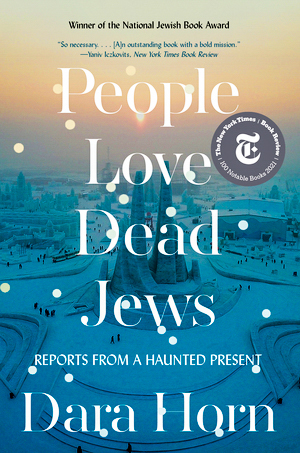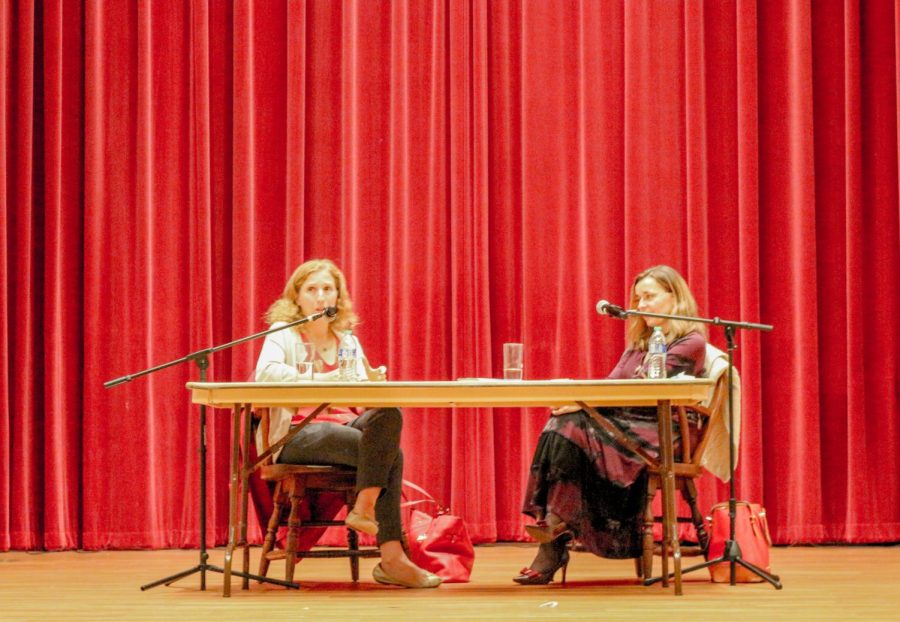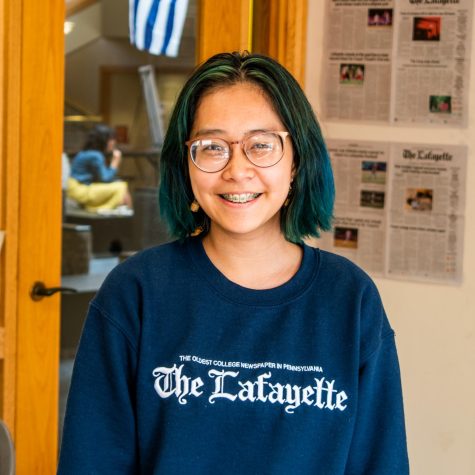Author Dara Horn has spent her career pushing back against the idea that Judaism should be defined by antisemitism. Instead of focusing on Jewish death, she seeks to highlight Jewish life.
On Wednesday, Oct. 12, Lafayette hosted Horn to talk about her new book “People Love Dead Jews,” which explores Jewish trauma and how it is exploited by non-Jewish people to console themselves.
Monika Rice, assistant professor of Jewish studies and Russian and East European studies, facilitated the first half of the event, discussing the book and its creation with Horn.
Horn began by discussing two questions that she often asks crowds at events: how many concentration camps can they name and how many Yiddish writers can they name? She said that while many people can do the former, few can do the latter.
“The reason this is relevant is that 80% of the people murdered in the Holocaust were Yiddish speakers … Why do we care so much about how these people are dying if we really don’t care how these people live?” Horn asked.
She explained how she was asked to cover the Tree of Life Synagogue shooting in Pittsburgh by the New York Times, and then six months later was asked to cover another synagogue shooting. She realized she had become “the go-to person for the emerging literary genre of synagogue shooting events.” It was this realization that prompted her to dive into the topic of how and why dead Jews are glorified.
She originally investigated this topic by exploring different mediums, including literature, film and education. She did not intend for her work to result in a book.
“There sort of are two intertwined threads here,” Horn said of her findings. “One is that people in non-Jewish societies tell stories about dead Jews that make them feel better about themselves. And then the other aspect of it is that living Jews often have to erase themselves in order for those stories to be told.”

Rice asked Horn about her critique of the way Anne Frank’s diary is taught in the American education system. Horn said that popular portrayals of Frank – and the quote that so often gets associated with her about how “people are really good at heart” – offer an idealized version of the Holocaust that serves only to flatter non-Jewish people.
“The reason we like this line is because we think it is inspiring, by which we mean it flatters us, right? Because it makes us feel forgiven for lapses in our civilization,” Horn said. “The problem is that the reality is so much simpler. Anne Frank wrote this line about people being truly good at heart three weeks before she met people who weren’t. Because three weeks after she leaves that line, she’s arrested. She’s deported to Auschwitz.”
Horn added that when people ignore the lives and accomplishments of Jewish people, they are also actively participating in the erasure that was central to the mission of the Holocaust.
“The Nazi project was not just about murdering six million Jews. It was about erasing Jewish civilization,” she said. “And by ignoring the stories of people who are living … we’re kind of participating in that erasure.”
Most Holocaust education, according to Horn, centers around the idea that bigotry is wrong because all people are essentially similar. However, Horn pushes back against this narrative, saying that most attacks on Jews today are on the Hasidic community, the sub-group with the most obvious differences from non-Jewish society.
Instead of teaching to not be hateful because people are all alike, she encourages schools to teach to not be hateful despite the fact that people are diverse.
“When we say the reason that you shouldn’t hate these people is because they’re just like you and me, we’re kind of saying that if they weren’t just like you and me that it’s kind of okay to hate them,” Horn said.
Horn concluded the discussion by explaining how Judaism can be considered a counterculture.
“Judaism is this counterculture that runs through the history of the West and challenges the history of the West,” Horn said. “The culture of Europe was not threatened by the Holocaust. Jewish culture was threatened and effectively destroyed.”
Horn’s book, which was the Winner of the National Jewish Book Award and was included on the New York Times’ list of 100 Notable Books of 2021, is available for purchase on her website.
























































































































